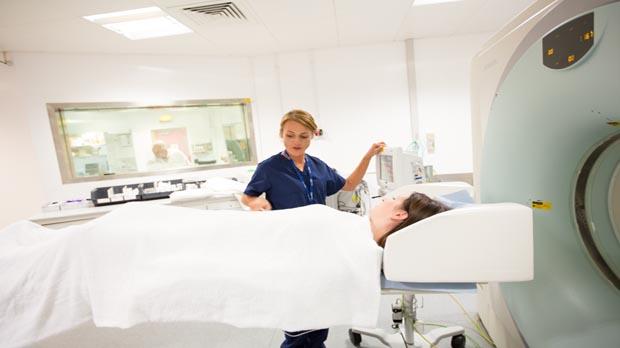
Around 1 in 5 people diagnosed with cancer in the UK take part in a clinical trial.
This trial used urokinase to help drain more than 1 pocket of fluid from around the lung to make breathing easier.
Some people with cancer have fluid collect between the lung and chest wall. This fluid takes up space that the lung would normally expand into when you breathe in. This can make breathing difficult and make you short of breath. This is called pleural effusion.
Doctors treat this by draining the fluid away. They do this by putting a tube into the space between the chest wall and lung. After draining the fluid they might also put talc in the space. This is to stick the lung to the chest wall and stop more fluid collecting. This is called pleurodesis.
But sometimes there is more than 1 pocket of fluid between the lung and chest wall. This makes it difficult to drain all the fluid away.
Urokinase is a drug that could help break down these pockets. Doctors might then be able to drain the fluid more easily.
The aim of this trial was to compare urokinase with a dummy drug ( ) to see if it could:
) to see if it could:
The research team found that urokinase didn’t improve shortness of breath caused by pleural effusion.
This was a phase 3 trial. It was a randomised trial. 71 people took part and were put into 1 of 2 treatment groups.

The team looked at:
When they compared the 2 groups they found there was no major difference between them.
The trial team concluded that urokinase didn’t improve shortness of breath or pleurodesis.
We have based this summary on information from the research team. As far as we are aware, the information they sent us has not been reviewed independently ( ) or published in a medical journal yet. The figures we quote above were provided by the research team. We have not analysed the data ourselves.
) or published in a medical journal yet. The figures we quote above were provided by the research team. We have not analysed the data ourselves.
Please note: In order to join a trial you will need to discuss it with your doctor, unless otherwise specified.
Dr Naj Rahman
Medical Research Council (MRC)
NIHR Clinical Research Network: Cancer
National Cancer Research Institute (NCRI)
Oxford Respiratory Trials Unit
Syner-Med PLC
University of Oxford
If you have questions about the trial please contact our cancer information nurses
Freephone 0808 800 4040

Around 1 in 5 people diagnosed with cancer in the UK take part in a clinical trial.